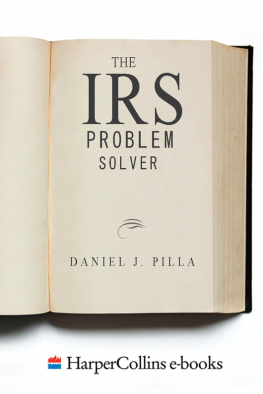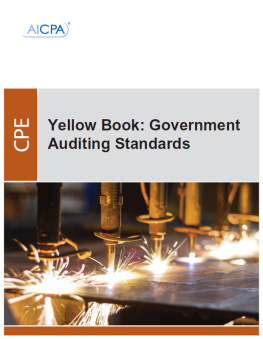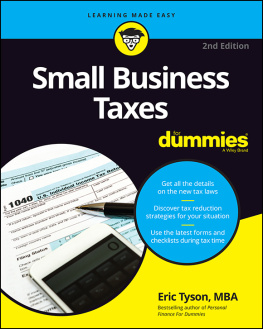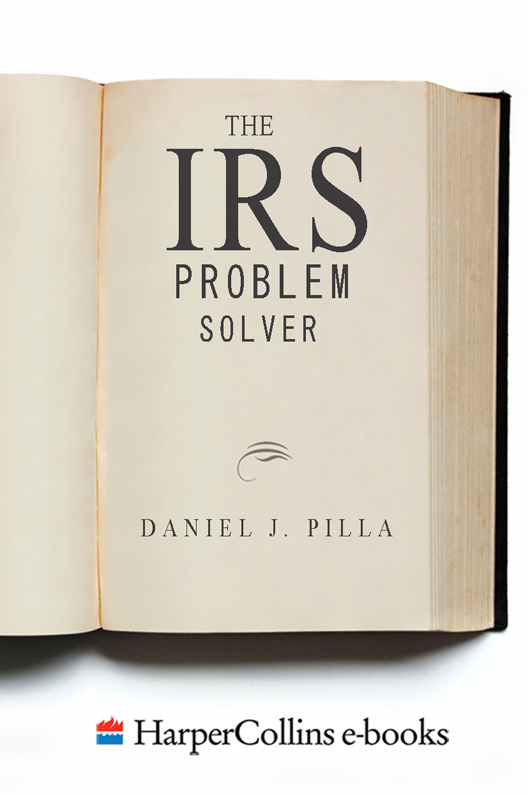The author and the publisher disclaim all liability for any damages resulting from the application of the information given in this book. This book is designed to present the authors findings and opinions based on research, analysis, and experience with the subject matter covered. This information is not provided for purposes of rendering legal, accounting, or other professional advice. It is intended purely for educational purposes. In publishing this book, neither the author nor the publisher is engaged in rendering legal, accounting, or other professional service. If legal advice or other professional assistance is required, the services of a competent professional should be sought.
Because the United States currently functions under an evolutionary legal system, the reader bears the burden of assuring that the principles of law stated in this work are current and binding at the time of any intended use or application. Caution: The law in this country is subject to change arbitrarily and without notice.
To Jeannie
Who can find a virtuous woman? For her price is far above rubies.
The heart of her husband doth safely trust in her,
so that he shall have no need of spoil.
She will do him good and not evil all the days of her life.
Proverbs 31:1012
contents
Guide
D o you remember when the IRS was in the hot seat? It was during the fall and winter of 1997 when angry members of the Senate Finance Committee grilled high-ranking IRS officials on wide-ranging allegations of official misconduct, disregard of its own rules and procedures, even maleficence toward citizensespecially middle-income taxpayers. Americans across the nation watched with a great sense of satisfaction as the tables were finally turned. Rather than the IRS causing fear and consternation in the lives of honest citizens, the agency found itself choking down the bitter taste of its own medicine.
The hearings into IRS abuse were the culmination of a decade of congressional action purportedly intended to curb what former Senate Finance Committee chairman William Roth referred to as extraordinary powers. In his opening remarks, given September 23, 1997, on the threshold of what would become three days of explosive testimony, Senator Roth predicted,
Over the course of the next 3 days we are going to see a picture of a troubled agency, one that is losing the confidence of the American people, and one that all too frequently acts as if it were above the law. This is unacceptable.
The hearings that followed featured testimony from citizens whose lives were upset and businesses devastated by IRS actions. The hearings culminated in passage of the Internal Revenue Restructuring and Reform Act of 1998. Perhaps the single aspect of the hearings that most clearly communicated the culture of the IRS and the manner in which the IRS operates was the portion that featured testimony from current IRS employees. And it is not the fact that current IRS employees testified against their own agency. Rather, it is how they testified that was so remarkable. You see, due to fear of retaliation from their colleagues, all but one of the IRS employees testified to the committee while physically hidden from public view and with their voices electronically altered so as to be unrecognizable.
The testimony of these witnesses buttressed the claims of IRS abuse that I have made for years. In a general sense, I have accused the IRS of using tactics of bluff and intimidation, misinformation and disinformation, and in many cases simply outright lying to citizens concerning their rights and the IRSs powers. The result of this is that millions of citizens pay taxes they do not owe or are otherwise subjected to treatment that other more savvy or informed citizens do not experience.
This is where my expertise comes into play. As a tax litigation consultant with more than twenty-five years of experience dealing with the agency, I have helped tens of thousands of people from all walks of life deal with IRS problems of every description. And just like those citizens who testified at the abuse hearings, the vast majority of citizens I deal with are honest taxpayers doing their level best to comply with an increasingly complicated and convoluted tax code. The uncertainty that flows from such complexity creates a level of anxiety that most citizens never experience in any other area of their lives.
This uncertainty naturally leads to fear whenever the initials IRS are mentioned. Most people would rather undergo a root canal than suffer through a tax audit. The idea of finding an IRS letter in the mailbox terrifies folks because, frankly, they are sure the news must be bad. This fear and uncertainty creates a second problem. That is, people generally tend to roll over when it comes to the agencys demands. Citizens do this believing either or a combination of two things: (1) if the IRS said it, it must be right, or (2) you cant fight the IRS anyway, so why bother?
These attitudes are responsible for countless millions of citizens paying taxes, interest, and penalties every year that they do not owe. Yet I have proved time and again that if you understand just a little about your rights and realize that the IRSs power is limited, you do not have to pay taxes you do not owe. That is the central premise of this book.
In the pages that follow, you will learn how to deal with:
IRS computer notices. Each year the agency sends millions of correction notices that have been shown to be wrong about half the time. With the grand total investment of a postage stamp and about thirty minutes at the typewriter, you can defeat these notices and keep your money in your own pocket, where it belongs.
Penalty and interest assessments. The typical tax bill nearly triples due to the addition of penalties and interest. But the IRS does not clearly explain that these additions can be canceled when you make the proper factual showing. The process is remarkably simple and highly effective when you have the right guidance in the first instance.
Tax audits. The dreaded tax audit is probably responsible for more sleepless nights than any other area of law enforcement. But what the typical citizen does not know is that the tax auditor has no real power over you. The audit process is largely one of bluff and intimidation, cleverly designed to mask the fact that the IRS audit results are wrong between 60 and 90 percent of time. Moreover, the process of appealing an audit decision is simple, inexpensive, and very effective.
Delinquent tax collection. The collection process is the most challenging of all IRS problems since it is in this area that the IRS uses its awesome tools of tax lien, wage and bank levy, and property seizure. But even when the IRS is threatening the worst, you have many important rights and the IRSs powers are limited in many important ways, allowing you to pay taxes on your terms, not theirs.
This book is not going to teach you to cheat on your taxes, evade the payment of taxes, or hinder the IRS in the administration of the tax laws. There are too many of those guides available, and sadly, they do nothing but sink people further into the quagmire of tax law enforcement. Instead, this book teaches the things that every American who earns income needs to know. At the core of this is the idea that your taxpayers rights put you on such a footing that you cannot be abused by the agency if you understand how to use those rights. But the key is, you have to know the rights exist in order to use them.
In the aftermath of the congressional investigation into IRS abuse, citizens tend to argue that IRS abuse is no longer a problem. The agency has been reined in, they say. This begs the question of whether the Restructuring Act was successful in trimming the claws of the IRS and improving taxpayers rights to the point where rogue IRS actions are no longer a threat. A casual observer might think so after examining the question through a superficial lens. The superficial lens provides a glimpse at three factors that might lead the untrained eye to conclude that we no longer have to fear the agency. Those three factors are (1) a purported legal shift in the burden of proof to the IRS so that citizens no longer have to prove their innocence, (2) the creation of a new IRS Oversight Board to check the behavior of the IRS, and (3) a dramatic drop in IRS collection actions.










